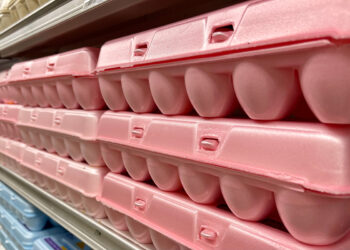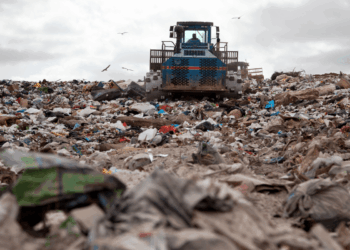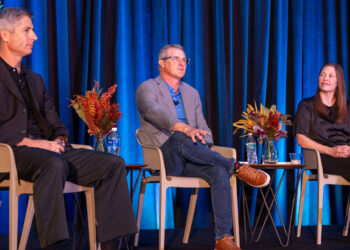Two U.S. MRFs have been on opposite ends of good and bad fortune this month, with a new $30 million facility opening in North Arlington, New Jersey, two days after a 23-year-old MRF was destroyed by a tornado in Columbia, Missouri.
Interstate Waste Services, which provides solid waste and recycling services in Connecticut, New Jersey and New York, said in a press release that the North Arlington MRF has an annual processing capacity of 215,000 tons. It includes a Machinex sorting system with artificial intelligence-powered robotics, magnetic separation and a dedicated glass clean-up system, among other features.
“IWS has always been ahead of the curve in recycling innovation,” CEO Michael DiBella said in a written statement. “This new facility is the next step in that evolution – an investment in advanced technology that improves capture rates, diverts more material from landfills, and delivers real environmental benefits to the communities we serve.”
New Jersey has been the site of several recent recycling investments, including a $47 million update to Atlantic Coast Recycling’s Passaic facility one year ago. The state passed a recycled content mandate for packaging in 2022 and is again considering an extended producer responsibility policy this year.
The new MRF will receive material from New York City’s five boroughs and take part in IWS’s waste-by-rail system, which the company said keeps hundreds of trucks off the road.
“Sustainability is a core value here in Bergen County,” Richard Wierer, director of solid waste for the Bergen County Utilities Authority, said in the press release. “We’re delighted to have such a facility in our county and look forward to the positive environmental impact it will have for our area.”
In the Heartland, meanwhile, Columbia’s city-owned MRF was a total loss after being hit by an EF-1 tornado on Easter Sunday, said Jason West, communications and outreach supervisor for the city’s utilities department.
At first the city responded by pausing all recycling collection, but it soon took the unusual step of continuing recycling pickup as usual while notifying residents that those recyclables will be landfilled.
“We can’t offer this service right now, but there are plans of building a new facility and resuming,” West said.
“This is just a temporary solution,” he added. “So when we are able to bring back the full program, people aren’t out of practice and don’t have to relearn everything that we had.”
Landfilling recyclables has been a fraught subject in recent years, with lawsuits accusing plastic manufacturers and others of lying about recycling while local program leaders fight against a tide of public skepticism and misinformation. Fort Smith, Arkansas, was taken to court after landfilling recyclables without telling residents about a decade ago, though the state Supreme Court ruled the city didn’t need to pay residents back for collection fees.
“We’re not trying to fool anybody,” West said. Columbia is still looking into other options, such as storing recyclables and shipping them weekly to the Kansas City or St. Louis areas, which sit roughly two hours away in opposite directions, he added.
Some private recyclers in the area, such as New World Recycling in Columbia, can take residents’ cans, bottles and boxes. And West said the city was already working on a new MRF before the tornado as well.
“In some regards, the tornado is helping us light the fire under that project,” he said – not least by simplifying the question of where to put the new facility. But the process could still take years: “This is the plan for the foreseeable future.”


























